|
|
|
Sort Order |
|
|
|
Items / Page
|
|
|
|
|
|
|
| Srl | Item |
| 1 |
ID:
134532


|
|
|
|
|
| Summary/Abstract |
Drawing on the pioneering work of Anthony Downs, political scientists have tended to characterize American politics as a game among undifferentiated competitors, played out largely through elections, with outcomes reflecting how formal rules translate election results into legislative votes. In this perspective, voters, campaigns, elections, and the ideological distribution of legislators merit extensive scrutiny. Other features of the political environment—most notably, the policies these legislators help create and the interest groups that struggle over these policies—are deemed largely peripheral. However, contemporary politics often looks very different than the world described by Downs. Instead, it more closely resembles the world depicted by E. E. Schattschneider—a world in which policy and groups loom large, the influence of voters is highly conditional, and the key struggle is not over gaining office but over reshaping governance. Over the last twenty years, a growing body of scholarship has emerged that advances this corrective vision—an approach we call “policy-focused political science.” In this framework, politics is centrally about the exercise of government authority for particular substantive purposes. Such exercises of authority create the “terrain” for political struggle, profoundly shaping both individual and group political behavior. More important, because policies can be so consequential, they also serve as the “prize” for many of the most enduring political players, especially organized interest groups. The payoffs of a policy-focused perspective include a more accurate portrayal of the institutional environment of modern politics, an appreciation for the fundamental importance of organized groups, a better understanding of the dynamics of policy change, and a more accurate mapping of interests, strategies, and influence. These benefits are illustrated through brief examinations of two of the biggest changes in American politics over the last generation: asymmetric partisan polarization and the growing concentration of income at the top.
|
|
|
|
|
|
|
|
|
|
|
|
|
|
|
|
| 2 |
ID:
113558


|
|
|
|
|
| Publication |
2012.
|
| Summary/Abstract |
Popular support for the welfare state varies greatly across nations and policy domains. We argue that these variations-vital to understanding the politics of the welfare state-reflect in part the degree to which economic disadvantage (low income) and economic insecurity (high risk) are correlated. When the disadvantaged and insecure are mostly one and the same, the base of popular support for the welfare state is narrow. When the disadvantaged and insecure represent two distinct groups, popular support is broader and opinion less polarized. We test these predictions both across nations within a single policy area (unemployment insurance) and across policy domains within a single polity (the United States, using a new survey). Results are consistent with our predictions and are robust to myriad controls and specifications. When disadvantage and insecurity are more correlated, the welfare state is more contested.
|
|
|
|
|
|
|
|
|
|
|
|
|
|
|
|
| 3 |
ID:
121589
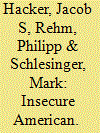

|
|
|
|
|
| Publication |
2013.
|
| Summary/Abstract |
Even before the sharp downturn that began in 2007, many Americans were concerned about economic risks. Yet this widespread public concern has not been matched by attention from political scientists regarding how citizens experience and understand the economic risks they face or how those experiences and understandings shape their views of public policy. We develop here an argument about the role of personal economic experiences in the formation of policy attitudes that we validate using a distinctive opinion survey of our own design, fielded not long after the onset of the Great Recession. The survey tracks citizens' economic experiences, expectations, and policy attitudes within multiple domains of risk (employment, medical care, family, and wealth arrangements). These investigations show that economic insecurity systematically and substantially affects citizens' attitudes toward government's role. Citizens' economic worries largely track exposure to substantial economic shocks. Citizens' policy attitudes in turn appear highly responsive to economic worries, as well as to the experience of economic shocks-with worries and shocks creating greater support for government policies that buffer the relevant economic risk. Attitudes seem most affected by temporally proximate shocks, shocks befalling households that have weak private safety nets, and shocks occurring within the domain most relevant to the policy in question, though attitudes are also (more weakly) correlated with shocks in other domains. The magnitude of these associations rivals partisanship and ideology and almost always exceeds that for conventional measures of socio-economic status. Given the long-term increase in economic insecurity and current sluggish recovery, understanding how insecurity shapes citizens' policy attitudes and political behavior should be a major concern of political science.
|
|
|
|
|
|
|
|
|
|
|
|
|
|
|
|
| 4 |
ID:
144609
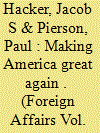

|
|
|
|
|
| Summary/Abstract |
At a debate [1]among the Republican presidential candidates in March, U.S. Senator Ted Cruz of Texas boiled down his campaign message to its essentials: “Here’s my philosophy. The less government, the more freedom. The fewer bureaucrats, the more prosperity. And there are bureaucrats in Washington right now who are killing jobs and I’ll tell you, I know who they are. I will find them and I will fire them.”
|
|
|
|
|
|
|
|
|
|
|
|
|
|
|
|
| 5 |
ID:
097815
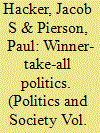

|
|
|
|
|
| Publication |
2010.
|
| Summary/Abstract |
The dramatic rise in inequality in the United States over the past generation has occasioned considerable attention from economists, but strikingly little from students of American politics. This has started to change: in recent years, a small but growing body of political science research on rising inequality has challenged standard economic accounts that emphasize apolitical processes of economic change. For all the sophistication of this new scholarship, however, it too fails to provide a compelling account of the political sources and effects of rising inequality. In particular, these studies share with dominant economic accounts three weaknesses: (1) they downplay the distinctive feature of American inequality -namely, the extreme concentration of income gains at the top of the economic ladder; (2) they miss the profound role of government policy in creating this "winner-take-all" pattern; and (3) they give little attention or weight to the dramatic long-term transformation of the organizational landscape of American politics that lies behind these changes in policy. These weaknesses are interrelated, stemming ultimately from a conception of politics that emphasizes the sway (or lack thereof) of the "median voter" in electoral politics, rather than the influence of organized interests in the process of policy making. A perspective centered on organizational and policy change -one that identifies the major policy shifts that have bolstered the economic standing of those at the top and then links those shifts to concrete organizational efforts by resourceful private interests -fares much better at explaining why the American political economy has become distinctively winner-take-all.
|
|
|
|
|
|
|
|
|
|
|
|
|
|
|
|
| 6 |
ID:
097828
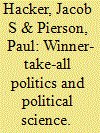

|
|
|
| 7 |
ID:
086645
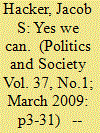

|
|
|
|
|
| Publication |
2009.
|
| Summary/Abstract |
What are the prospects for meaningful reform of U.S. health care? To answer this question requires understanding why previous reform efforts (and in particular the 1993 Clinton health plan) failed-the combination of deep structural biases against large-scale public provision and the inherited constraints posed by the rise of employment-based insurance. Generally, the context is more favorable today than it was fifteen years ago. But the prospects for change hinge on learning the right lesson of history: Politics comes first. Putting politics first means avoiding the overarching mistake of the Clinton reformers: envisioning a grand policy compromise rather than hammering out a real political compromise. It also means addressing the inevitable fears of those who believe they are well protected by our eroding employment-based framework. And it means premising political strategies on the contemporary realities of hyperpolarized politics, rather than wistfully recalled images of the bipartisan politics of old.
|
|
|
|
|
|
|
|
|
|
|
|
|
|
|
|
| 8 |
ID:
100782


|
|
|
|
|
| Publication |
2010.
|
| Summary/Abstract |
Amitai Etzioni has written something of a pocket guide for public intellectuals, proffering hard-won lessons from his own time in the trenches. I wish that I had read his primer before I tried to break into the club. And I hope that PS readers seeking to be PI players read his guide with the right mix of humor, curiosity, and skepticism about the rules of success that Etzioni evinces.
|
|
|
|
|
|
|
|
|
|
|
|
|
|
|
|
|
|
|
|
|